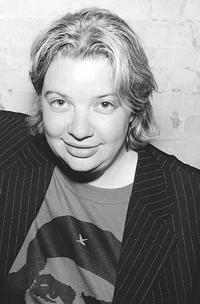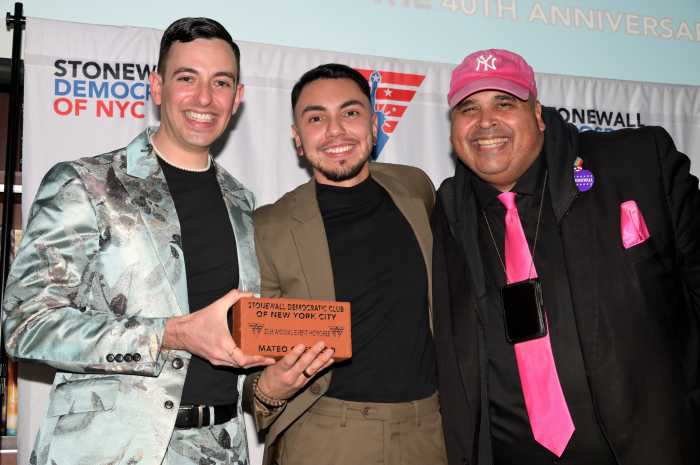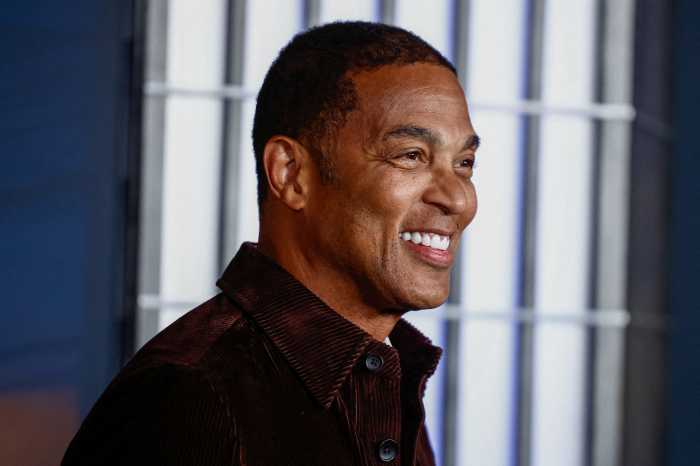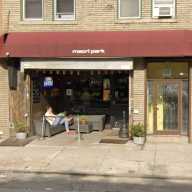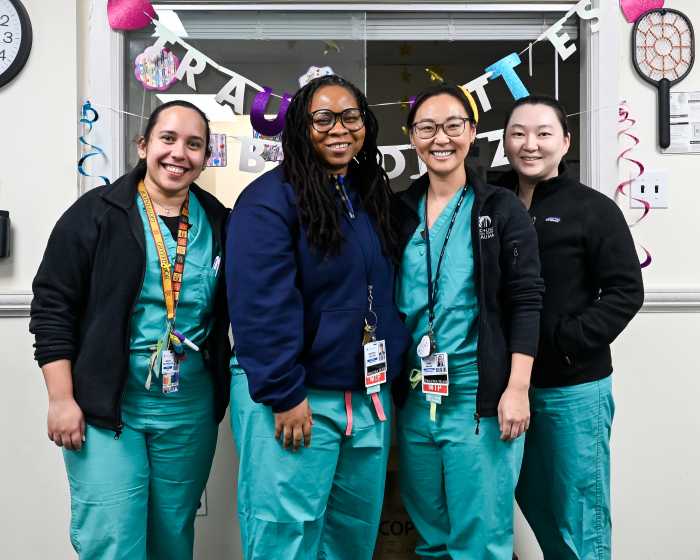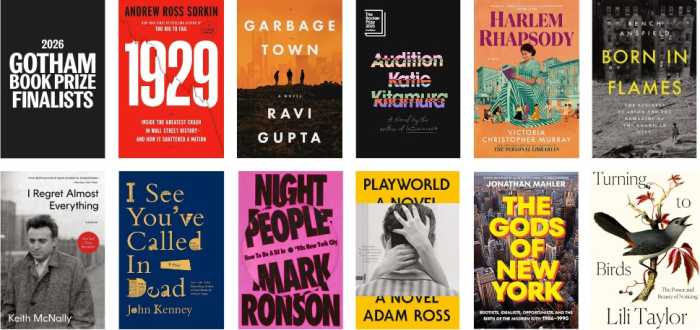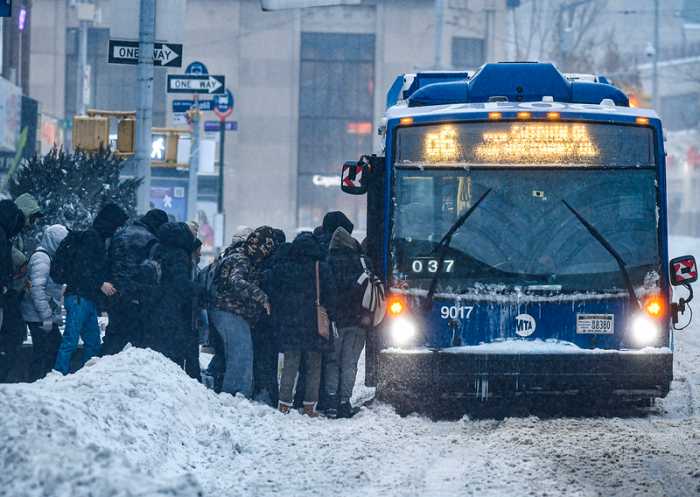Brooke Webster recreates popular Manhattan bar in Brooklyn
Brooke Webster is best known as the owner of Meow Mix, the legendary Lower East Side lesbian watering hole that closed its doors in 2004 after a decade of playing host to hot female deejays, up-and-coming bands like Sleater-Kinney, and even the coming out press conference for Ellen DeGeneres and Anne Heche. Her current venture, Cattyshack, a two-story pleasuredome for Brooklyn’s lesbians, trannies, gay boys and their pals that recently celebrated its one-year anniversary, will be the home for Webster’s next business venture — capitalizing on the transformation of formerly industrial areas of Park Slope into hip new neighborhoods.
Webster, 35, is a savvy businessperson. She has been part of the New York Nightlife Association and the president of the East Village/Lower East Side Chamber of Commerce. She has courted local politicos and learned those skills in labor organizing and as a member of the AIDS Coalition to Unleash Power (ACT UP) in Chicago, her hometown. She also worked on human rights causes spending time as a national coordinating member of the Committee in Solidarity with the People of El Salvador in the late eighties.
Christopher Murray: What does it mean for you to be a lesbian businessperson?
Brooke Webster: Sometimes I think I’m a professional, full-time lesbian. In my job, I deal with every layer of the community and whatever it goes through. For me, bars in the gay community are not just about drinking, there are plenty of people who come and don’t drink, but it’s a place where people are able to be who they are, are able to become who they are, but also are able to feel safe. A place like Cattyshack is a little territory that we have control over. I’m part of that. I feel I’ve been a full-time lesbian all these years because every night, I see people in every state, being drunk, going through a break up, and falling in love. I see them when they meet the person they’re going to be with for five years and I see them again when they show up after that’s over. It’s a good thing I’m not a gossip. I see the younger people making their big steps into coming out and the over fifty crowd who come in to sit and have a glass of wine, who can say, “I feel comfortable going out, it’s not just for the young people.”
CM: How did you come to be a bar owner?
BW: I accidentally got into it. I was going back and forth between El Salvador and Chicago, where I grew up, and then moved to New York to be a labor organizer. I just got frustrated with having to go to straight bars to hear the music I wanted to hear. When I went to gay bars to be with my community, I didn’t hear any of the music or the culture I identified with. I started Meow Mix as a Saturday night party with fifteen dollars worth of flyers and basically it blew up that first week, we had a line down the block, and it obviously met a need for lesbians and members of the queer community who didn’t just want to hear house music or house re-mixes. People wanted to hear punk rock, hip hop, reggae, Latin music and more edgy stuff. Four months into it, I bought half the place from the owner, who wasn’t doing very good on the other nights. Six months after that I got investors and bought him out. We started in October of 1994 and we were seven nights a week by February of 1995.
CM: After Meow Mix, why open Cattyshack in Brooklyn?
BW: When I first opened Meow Mix in the Lower East Side, that’s where we all lived, all the sort of edgy lesbians. We had cheap rent. We lived below Avenue A where no one else would live. That’s usually how neighborhoods grow. A lot of my customer base doesn’t live in that neighborhood anymore. So it made sense for me to move somewhere that was centrally located and where I always wanted to do something. I also think that Cattyshack keeps Park Slope gay in a certain way. Even as rents go up, and property costs rise, we’re on the edge of Park Slope and a lot of surrounding neighborhoods and I already know tons of girls who have been like “I’m moving from Williamsburg over there.” Parts of the West Village seem really straight to me now. I think that’s what happens as a neighborhood changes: our community makes it safe and cool, we have places we create with a security person posted at the door until four o’clock in the morning, and that’s when rents go up and everyone else moves in and complains about noise and we get pushed out.
CM: Cattyshack is on the edge between the high-rent Slope and the previously more industrial area down towards the Gowanus Canal.
BW: Fourth Avenue between President and Carroll. It was three different offices and a warehouse downstairs, we completely gutted it. I found the space by accident, I had been looking a lot and found it and people said, “Fourth Avenue? You’re crazy!” Because I pay attention and get a lot of weird mailings from community groups, I saw that the zoning changes had passed and I jumped on it. The big thing for me was that we were able to do an outside deck where people could smoke and drink but where we could also control people’s noise level and littering and anything that neighbors could be unhappy about. We could also get a cabaret license so I don’t have to tell my customers that they can’t dance.
CM: What’s your least favorite thing about being a bar owner?
BW: The bureaucracy. You don’t get a handbook when you get your liquor license, you figure out what you’re supposed to do as you get ticketed for it. Being a tattooed lesbian who spent a lot of time on the Lower East Side and grew up on the West Side of Chicago, sometimes I don’t like going to those court buildings and having to be official. I don’t like when we have to kick somebody out. But I have to say I’m very lucky. I get to spend time with a great community in New York that really cares about each other.
CM: How old were you when you came out?
BW: I was 17, I think it was pretty obvious to everyone. I had a boyfriend in high school, but it was more something to do, someone to drive you around. I think I totally broke his heart because it was so obvious. We all picked guys to go to homecoming with and then totally ditched them and went and hung out with a bunch of girls. I started the first Students for Peace and Justice group in my high school that would make sure that it was safe for same-sex couples to go to the prom a couple years after I graduated.
CM: You seem really focused on safety.
BW: It’s important. We are the most open and comfortable Brooklyn bar for the growing [female to male] transgender crowd. A big percentage of our staff is trans; we have a trans party; we don’t have any gender in our bathrooms, they are completely unisex. I’m really proud of that because I think there’s still a lot of discussion that needs to happen in our community about what’s going on healthwise and how people are going through their transitions. They need to feel they are supported and have a place to be.
Park Slope is not just Dyke Slope. Lots of different types of people come to Cattyshack. I hope the guys keep coming, like they have been. That’s what I love about this place too, that’s the revolutionary moment, when we have racial diversity, the whole queer community here, and even some of our straight friends who are respectful. We are all hanging out together having a great time.
CM: What are your new plans?
BW: Next door to Cattyshack, I’m going to open a 24-hour diner called CoffeeShack, hopefully before the end of the year. We hope to start construction by the end of the summer. We’ll have a countertop space, a takeout window, we’ll be featuring different organic coffees including organic, Brooklyn-roasted Gorilla Coffee, another lesbian-owned business in the neighborhood. We’ll have an indoor-outdoor space, another deck, a classic Art Deco diner with 24-hour breakfast and real hash browns. Everyone can get their coffee to go from the window. It’ll be my first restaurant. I’m scared but excited.
CM: Do you have a personal life?
BW: Not right now. I am taking a break from my personal life. When I owned Meow Mix, I had a four-year relationship and then a five-year relationship. They were both fantastic, I love them both very much. This business doesn’t lend itself to longterm relationships sometimes, especially if people have day jobs. Right now my focus is that I want to keep some parts of Brooklyn really cool and I have other plans for after CoffeeShack and once that’s done then I could actually give some time to someone, but for right now I have my eyes on the prize.
gaycitynews.com

